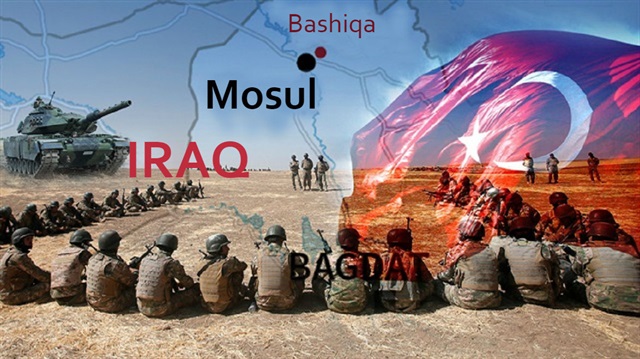
As the Mosul operation was launched without Turkey's military, Ankara is preparing for a “B” and “C” plan in northern Iraq
Turkey's alternative plans have become the most discussed issue following the statement of Turkey's President Erdoğan that if Turkish military is not included in the Mosul operation, a “B plan" would be implemented.
According to top officials from Ankara, Turkey has been conducting intelligence and diplomatic processes over Mosul for the last 11 months.
Three plans have been prepared over three scenarios as Turkey's first priority was to join the Mosul operation actively.
Ankara had suggested to join the operation actively, though the initiative would not succeed due to the U.S. and Iraq's Shiite government.
Turkey was the sole country that had a regional diplomatic mission in Mosul until June 2014, before Daesh captured the city.
Since then Turkey had continued intense dialogue with Sunni Arab and Kurdish tribes as well as Turkmens.
Turkey's intelligence network in the area makes Ankara more important than Baghdad.
However, if the operation is launched without Turkey's involvement, Ankara is ready to implement plan B.
According to the second plan, Turkey would move its military that is stationed in several bases in Iraq, including the Bashiqa camp, towards the city of Mosul.
The move would happen if the U.S. and Baghdad continue insisting on PKK terror organization's involvement in the operation.
Turkey's military would launch the operation under the request and coordination with Northern Iraqi Kurdish Regional Government (KRG), former Mosul government Asil Nujaifi and the Mosul Provincial Assembly members.
Under this plan, Turkish Armed Forces, which have been training Peshmerga fighters, Turkmen forces and Sunni al-Hashdi al-Watani groups, would organize the groups and lead them.
A total of 40,000 Kurdish Peshmerga and Sunni Arab armed forces would be coordinated by the Turkish military.
The Bashiqa military camp, around 20 kilometers from the Mosul city center, would be the headquarters of the operation.
If the second option would be implemented, the operation for liberating Mosul would continue much longer than the predicted period.
But, the city would be cleared of Daesh in a controlled process and with less civil causalities.
If Turkey-backed forces face any obstacle from the Shiite groups, Peshmerga fighters would teach them a lesson as they did against the Tigris Army of ex PM Maliki in 2012.
During this operation, a close coordination will be maintained with Russia and Moscow would be informed in every development of the operation.
The U.S. administration and Iraqi government can press Sunni Arabs and KRG government against Turkey.
If Washington and Baghdad continue its anti-Turkey stance and attempt to use local forces against Turkey and Turkey's national interest and security is under threat, Ankara would launch a military operation in northern Iraq to support Turkmens in Tal Afar.
The operation could be similar as the operation Euphrates Shield in northern Iraq.
Local Turkmen fighters would be supported to protect themselves and liberate the Turkmen areas from the terror groups.
Under this plan, Turkey would be a shield for 410,000 Shia-Sunni Turkmens in the city.
Turkey had already stationed security units in Tal Afar that are closely following the Mosul operation and informing Ankara about any single detail.
The Turkish authority as well as Sunni and Kurdish groups in the area strongly believe that the operation excluding Turkey would hardly succeed.
Rather it would spawn a long-standing sectarian conflict in the city that would make Turkey's involvement a must.
Hello, the comments you share on our site are a valuable resource for other users. Please respect other users and different opinions. Do not use rude, offensive, derogatory, or discriminatory language.
The floor is all yours.













